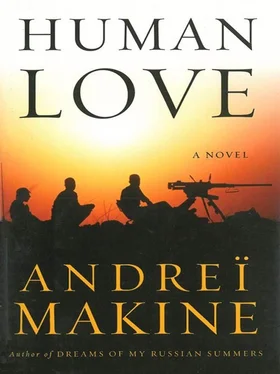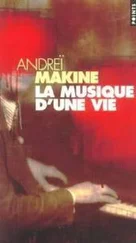Is there such a great change, in fact? Over fifteen company in question has changed its name. The networks have reconstituted themselves. And only a handful of people would still be able to guess that the “upholder of the law” in question was Elias Almeida.
In fact, he has no other life than this ghostly presence in memories now grown confused, repressed, indecipherable. I remember hastily noting down the stories he told me, joining the dots between our various often chance encounters in Africa, in Europe, in the United States. But I can no longer conceive of any logic that might link these fragments, apart from the failure of all that he dreamed of, the loss of the one he loved.
Out on the terrace, I again locate Lupus, the constellation of the Wolf, in the dense black sky. Down below, on the hotels broad front steps, the crowd of guests is preparing to go and explore the night life of this African capital. The party goes on. The thick necks settle into grotesque limousines, the rank and file are assigned to broken-down minibuses. At a certain level of social clownishness, human stupidity almost inspires compassion. On the far side of the frontier, so close to this city, war rages, villages burn, adults kill children, other children become killers. The world against which Elias Almeida fought… The door onto the neighboring terrace opens; two figures hidden in the darkness settle into deck chairs. The fat white woman and her friend from Kinshasa embark on a verbose prelude to coitus.
***
This evening I decide to abandon the search for any rational order in the fragments of the past my memory has retained. The logic of history the causes of every war and every peace, universal morality – none of that has ever helped humanity to prevent a boot smashing a woman’s collarbone and children learning to kill. It was that night in Lunda Norte that made me wary of all those learned abstractions. Instead of history what I saw then was soldiers gripping a woman crouched on all fours, whom they had just raped and killed. One of them extracting the tiny granules of rough diamonds from her dead mouth. Now a child rigged up in a gas mask thrust his hideous head in at the window of our prison, threatening us with a weapon too heavy for his thin arms. Elias talked to him and learned that the boys father had been shot by President Neto’s regime, which was liquidating “factionalists.” Uneasily, I clung for a moment to the “historical logic” of the struggle against the enemies of the revolution. Finally I realized that what this lofty logic came down to was the gaze of that child high on cannabis, Eliass body, covered in infected wounds, and that woman’s distorted mouth, where a big breathless soldier’s fingers searched for ugly little pebbles. On his left cheek there was a scar in the form of a star. Next morning he was one of the few to escape the Cuban commandos. I had stopped with Elias close to a pit dug for the raped Zairean woman and the child with his face hidden by a gas mask. The earth was reddish brown, with a good smell of humid undergrowth. “The Kremlin will never forgive Neto for renewing contact with Mobutu… Elias murmured as if to himself. Five months later, in September 1979, Neto was dying in Moscow. The logic of history… Beside this grave for the Zairean woman and the child the notion of an archaeological dig passed through my mind as in a bad dream: what would the archaeologists of the distant future make of our civilization when they discovered this skeleton of a woman, with a few fragments of diamonds in its mouth, and that one of a masked child?
I hasten to write down what I know of Elias Almeida’s life. Without imposing any order on these fragments. Sometimes I am tempted by the novelistic play of coincidence: the poet Neto, having become president, kills thousands of men and then dies, as if in a funeral ode, by taking poison in a glass of champagne offered him by a pretty woman who, quite calmly, watches him die. An easy game, I know, these coincidences. Reality prefers failure, delay, the impossibility of communing in thought with a loved one. When he arrived in the Congo at the age of fifteen to join his father, there was an episode Elias had wanted to tell him about: a truck filled with Portuguese soldiers drives past, a burst of submachine gun fire, bullets ripping apart the foliage, birds scatter, others fall, and one limps in the dust, its wing broken. The soldiers’ laughter, the silence. The grandiose randomness of evil. Above all, Ellas wanted to tell his father about the circumstances of his mothers death. “Yes, I know I’ve been told about it,” his father said hurriedly. “Yes, that’s… how it is.”
Perhaps the true logic of life might be wholly contained in this unanswerable: “That’s how it is.”
Kinshasa. A black-and-white film .
A FAIR, MILKY SKIN, THICK, FLESHY THIGHS: a woman hitches up her tight-fitting skirt and settles herself into a large luxury car. Glaring lights stand out in the night, as always in Africa. The woman’s excessively golden hair glitters. Her stiletto heels oblige her to lift her knees quite high as she sits down. Her body folded up on the seat is reminiscent of a… yes, a fat turkey trussed for the oven.
In the press of the crowd on the palace staircase I intercept Elias’s look, his brief smile. No other exchange should indicate that we are acquainted. With a swift, knowing gaze he points out a face to me, amid the throng of dark suits and evening dresses. An African of about forty, tall, corpulent, a little too tightly squeezed into a designer suit. Dilated eyes, nostrils visibly quivering. He stares at the woman wriggling about on the seat, adjusting her skirt around her broad thighs, as she seeks a comfortable position for her high heels. This feverish attention is lost among the whirlwind of words of farewell, little laughs, grotesque bowings and scrapings, in which “President” and “General” are bandied back and forth, the flutter of visiting cards, the bustle of chauffeurs and bodyguards. The man devouring the turkey-woman with his eyes believes he is invisible. On his left cheek I suddenly make out a pale asterisk, the trace of a scar. The face of the soldier retrieving diamonds from the mouth of a dead woman comes back to me. A coincidence? I should like to ask Ellas, But he has gone already, and besides, would he know himself?
Several days later I learn that the man with the scar on his cheek is known to our secret services as “the Candidate” – a Zairean established in Luanda who manages the sale of Angolan oil to the Americans, who have never recognized Marxist Angola. They are thus buying oil from a phantom state! And the “Marxist” Angolans are buying themselves villas in Europe thanks to the oil sold to the American imperialists with whom they are at war. The logic of history… Washington has its money on “the Candidate,” as a probable successor to Mobutu in Zaire. Soviet intelligence have had their eye on this man for several months. The turkey-woman makes a good bait…
This frenzied tangle of world affairs, the energy of thousands of men confronting one another, plotting, selling incalculable riches, piling up millions in secret bank accounts, wooing their enemies and tearing their allies to pieces, dragging their countries into long years of war, starving whole regions, paying armies of hacks to glorify their policies, all this crazy global machinery is concentrated that evening in the fleshy body of a blond woman whom a sweating black man would like to possess.
In Elias’s look I perceive the rapid alternation between a fighters hardness and immense sadness better than before.
A brief while later the dossier on “the Candidate” is enriched by a filmed sequence: him and the turkey-woman bonded together in a monotonous coupling. From time to time the woman reaches under the man’s body to make sure the contraceptive has not slipped… There is not much light in the room, and when she gets up, the woman peers at her underclothes to avoid putting them on inside out. From the bed the man watches her doing this, with a stubborn, strangely hostile air. The other, shorter sequence has a greater variety of light and shade. In it the man’s half open mouth can be seen, his eyes slightly bulging, staring at the woman whose head thrusts up and down rhythmically as she fellates him. Then he sleeps, while the woman rummages in a briefcase and page by page photographs a thick notebook with glittering gilt edges.
Читать дальше









